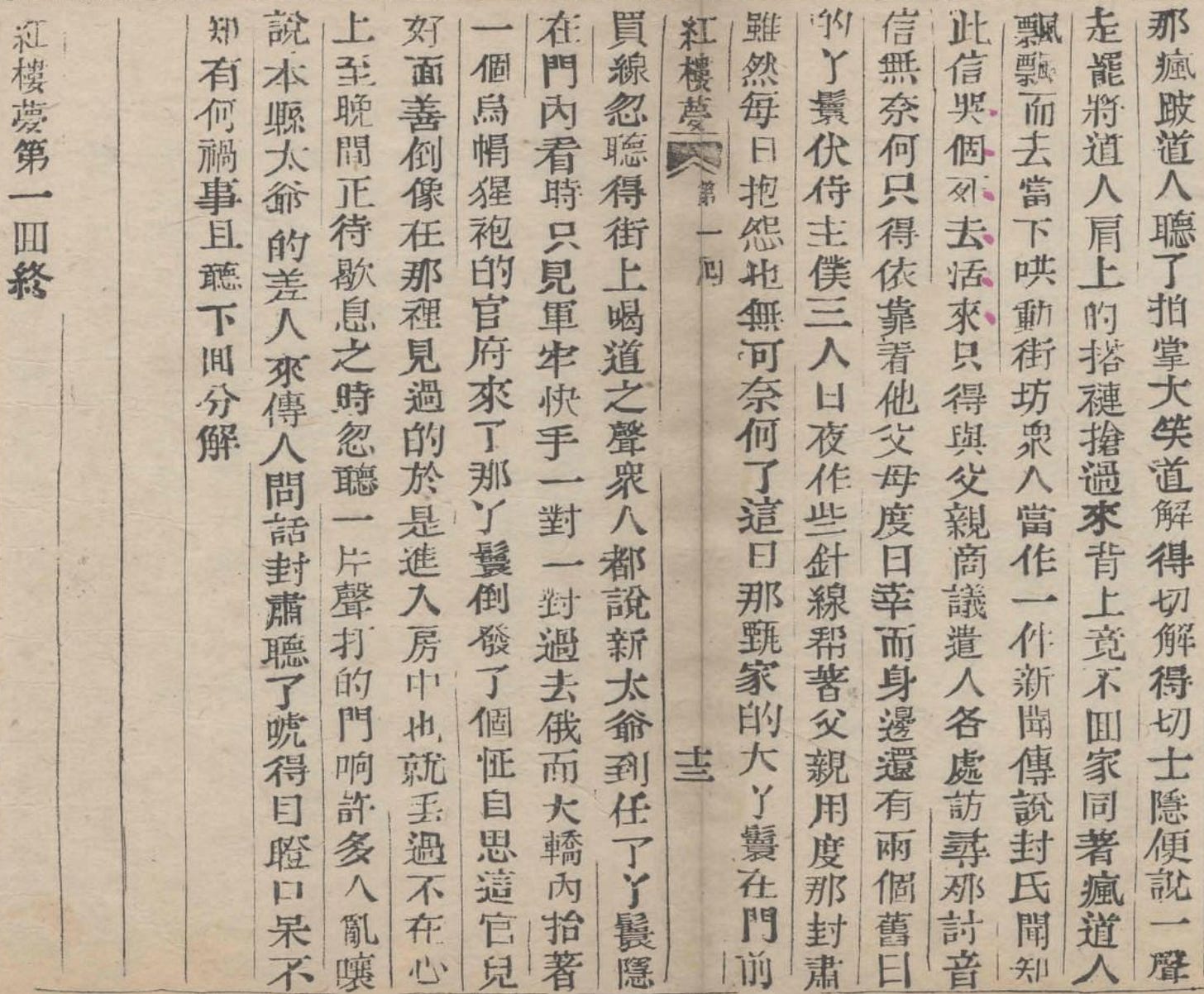Zhen Shiyin Runs Away
The end of the first chapter of Dream of the Red Chamber (紅樓夢)
Zhen Shiyin Runs Away
As the first chapter comes to a close, Zhen Shiyin runs away, leaving his wife in tears and his father-in-law furious. And then things get only worse, as an official procession comes to visit and interrogate his father in law. We end the chapter on a cliffhanger.
Chinese Text

那瘋跛道人聽了,拍掌大笑道:「解得切,解得切!」士隱便說一聲「走罷」,將道人肩上的搭褳搶了過來背上,竟不回家,同著瘋道人飄飄而去。
當下鬨動街坊,眾人當作一件新聞傳說。封氏聞知此信,哭個死去活來,只得與父親商議,遣人各處訪尋。那討音信?無奈何,只得依靠著他父母度日。幸而身邊還有兩個舊日的丫鬟伏侍,主僕三人日夜做些針線,幫著父親用度。那封肅雖然每日抱怨,也無可奈何了。
這日,那甄家的大丫鬟在門前買線,忽聽得街上喝道之聲,眾人都說:「新太爺到任了。」丫鬟隱在門內看時,只見軍牢快手一對一對過去,俄而大轎內抬著一個烏帽猩袍的官府來了。那丫鬟倒發了個怔,自思:「這官兒好面善!倒像在那裡見過的?」於是進入房中,也就丟過,不在心上。至晚間,正待歇息之時,忽聽一片聲打的門響,許多人亂嚷,說:「本縣太爺的差人來傳人問話!」封肅聽了,唬得目瞪口呆。
不知有何禍事,且聽下回分解。
Translation Notes
搭褳 means a type of long, narrow cloth bag.
鬨動街坊 means “cause a disturbance in the neighborhood”
死去活來 means “to be devastated”
那討音信 might be confusing. 那 here would be 哪 (where) in modern Chinese. 討 is to ask for, and 音信 is news or information. Basically, this means something like “but where could they look?” or “but who could they ask for news?”
用度 is fee or expense.
喝道 is to yell at people on the road to tell them to make way for an approaching government official.
軍牢快手 were low ranking officials. 軍牢 (literally “military prison”) were officers (often ex-soldiers) who were tasked with escorting prisoners, maintaining order, or serving as guards for officials. 快手 (“quick hands”) were constables known for their speed in apprehending criminals and executing orders; hence the name.
烏帽猩袍 was the clothing of a court official: a black hat (烏帽) and a bright red robe (猩袍).
面善 means familiar looking.
目瞪口呆 literally means “with eyes wide open and unable to speak,” and means dumbstruck or stupefied.
不知有何禍事,且聽下回分解 marks the end of the first chapter. It’s a cliffhanger ending: if you want to find out the “awful thing” (何禍) that was about to happen, you have to read on. This type of ending was closely tied to storytelling and story performances in ancient teahouses, where professional storytellers knew that they needed a cliffhanger ending to get the audience to come back again. In general, the cliffhanger winds up being a fake tragedy: usually the tension is resolved early in the next chapter.
Translation Critique
Because this section is relatively straightforward, both Hawkes and the Yangs translate it well. The only quibble I have is how the Yangs translate Feng Su’s complaints: “For his part, grumble as he might, he had to lump it.” “Have to lump it” appears to be an American English slang phrase. I didn’t hear it at all growing up, but I can see after a few searches online that it is common in some places. It’s an awkward way to translate 無可奈何, a common modern idiom (I hear it all the time) that simply means “there’s nothing you can do.”
My Translation
Keep reading with a 7-day free trial
Subscribe to Dream of the Red Chamber to keep reading this post and get 7 days of free access to the full post archives.




